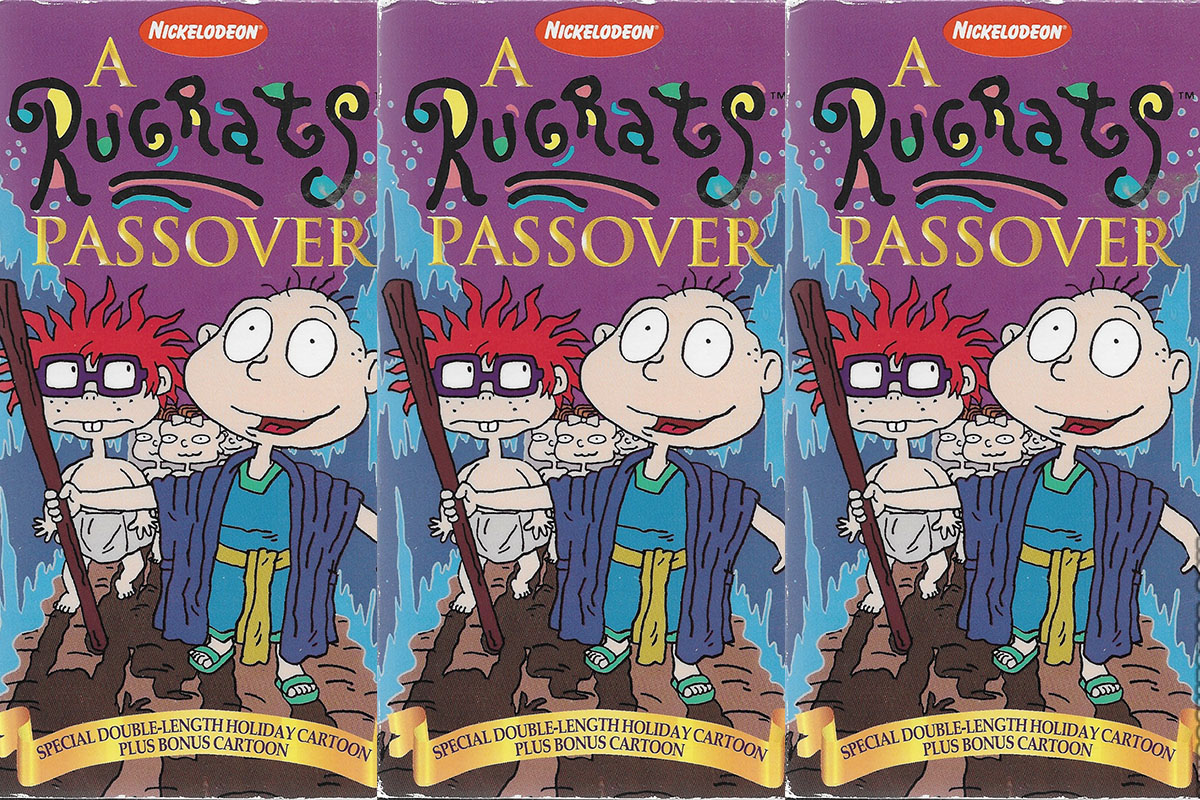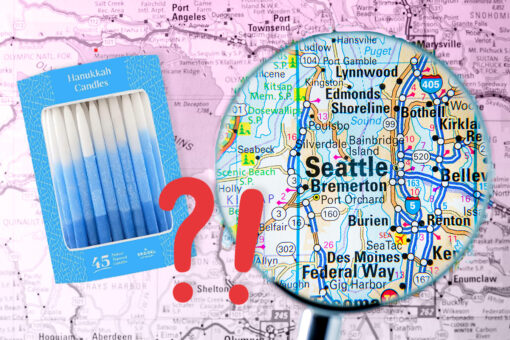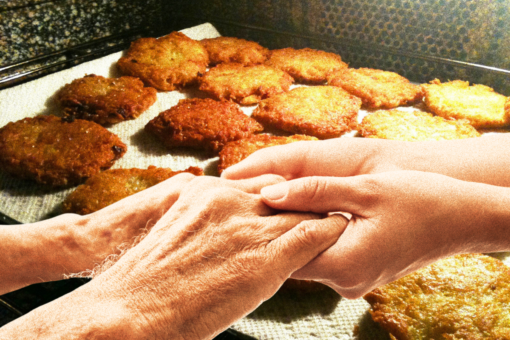The classic “A Rugrats Passover,” which originally aired April 13, 1995, shockingly tells the story of Passover. It was one of the most popular episodes in the entirety of the Rugrats run, nominated for an Emmy, and Nickelodeon’s first programming about Passover. As the New York Times wrote when the episode aired in 1995: “If not a first, it certainly is a rarity: a cartoon series devoting an episode to a Jewish holy day.”
In one word, A Rugrats Passover was ICONIC.
But we wanted to know how accurate this retelling of the Passover story actually is. Only 23 minutes, there’s a lot to cover.
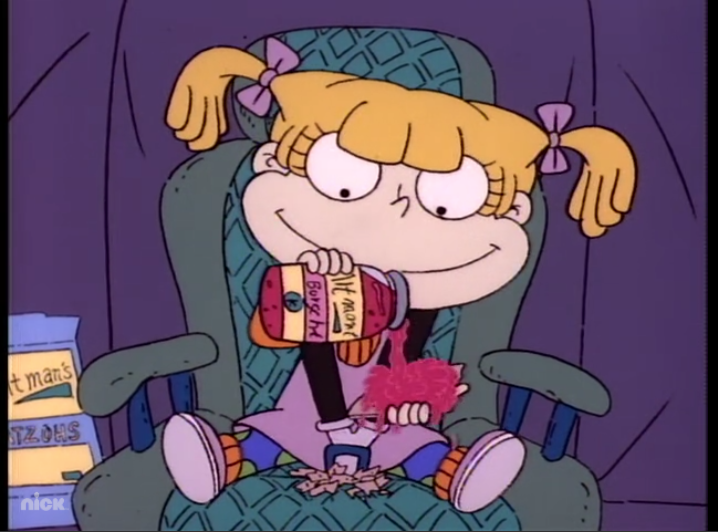
The episode starts with Angelica in her carseat, putting jelly on matzah. Angelica’s family is on the way to Boris and Minka’s house (Tommy’s grandparents), and Angelica is upset that they’re going, but her dad says, “Angelica, maybe you’ll have fun. Passover is a very meaningful holiday.” And her mom explains to her that Passover’s about freedom.
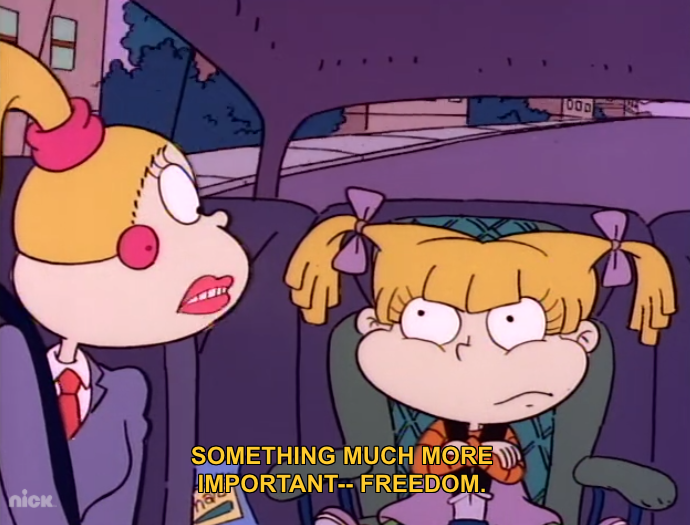
Fact check #1: Passover is about freedom.
Verdict: Accurate. The gist of the Passover story is “once we were slaves in Egypt, and now we are free.” It’s the tale of liberation of the Hebrews and their journey to Israel. As My Jewish Learning explains, “This is the holiday that celebrates God’s intervention in history to lead the Israelites from slavery to freedom.”
Then we see Tommy in the car with his parents. Stu (Tommy’s Dad) is complaining that the seder is so boring. Didi refutes him, saying, “Passover isn’t boring! It’s a very meaningful holiday… the Passover seder is a time for Jewish families to come together and retell the history of their people. We’ve been doing it for thousands of years.”
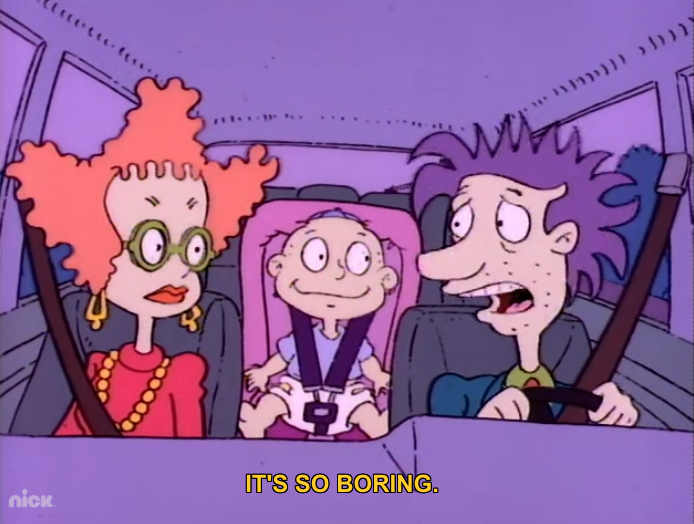
Fact check #2: The seder has happened for thousands of years.
Verdict: accurate. As My Jewish Learning explains in their article about Passover history, Passover observance has taken a number of forms throughout time. The first appearance of the Haggadah (the book used at seders) is found around 200 C.E. So Didi is right: The celebration of Passover and retelling the history of the Jewish people has happened for thousands of years.
Minka and Boris, in heavy accents, argue about whose wine glasses to use. Boris’ father’s came from Smolensk (in Russia), and Minka’s mother’s came from Vilnius (Lithuania). Both these places had significant Jewish populations until the Holocaust.
This argument over wine glasses is going to be the start of the plot. Sidenote: There was a huge controversy over the design of Boris and Minka; in 1998, the ADL issued a statement saying their depictions were anti-Semitic and compared them to drawings from a 1930s Nazi newspaper.
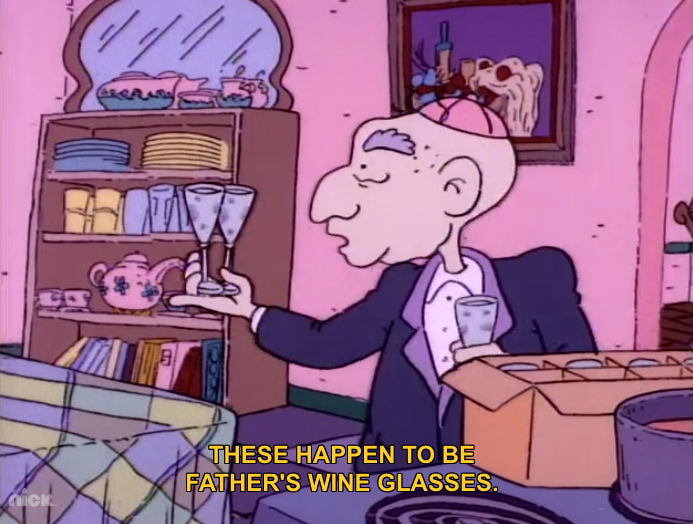
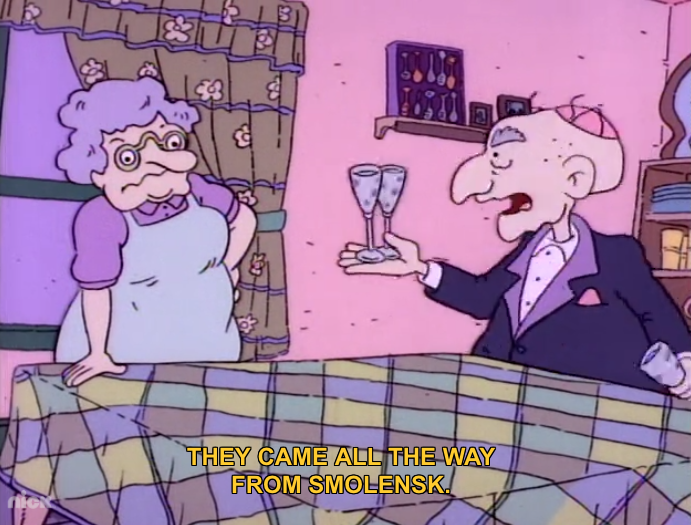
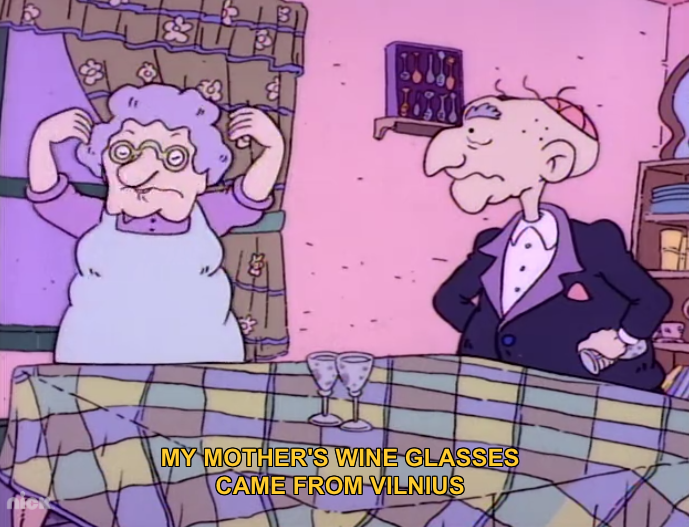
Fact check #3: arguing over traditions.
Verdict: Yeah, we’re going to go ahead and guess this happens in nearly every Jewish home around Passover.
Angelica and her parents arrive at Tommy’s grandparents house. Angelica asks for a cookie, and is refused by her mom, who explains, “You can’t eat anything with bread.”
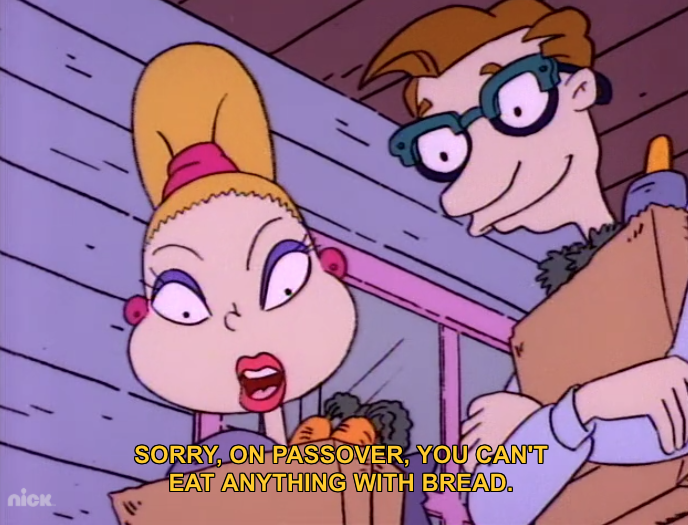
Fact check #4: no bread on Passover.
Verdict: I think we all know this one. Accurate! During Passover, Jews avoid food made from leavened grain.
Tommy’s family also arrives, and Tommy’s grandma Minka starts crying that her husband ran away from her (over the aforementioned wine glass fight). They decide to go ahead with the seder anyway and finish prepping the foods. Stu gets to grind the gefilte fish.
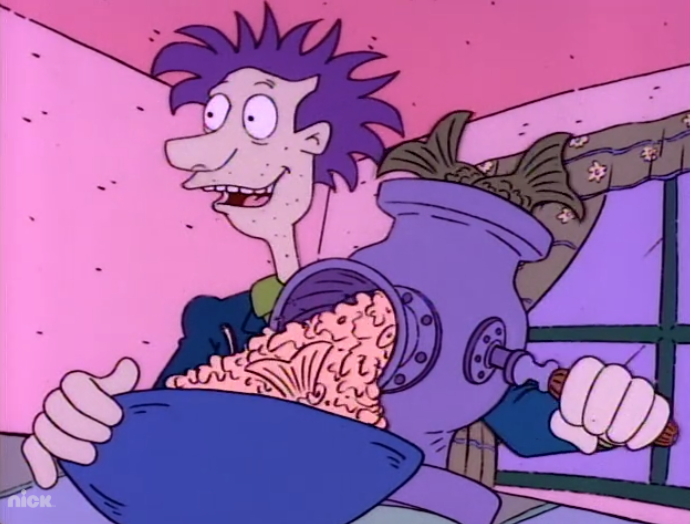
Fact check #5: Gefilte fish is made by grinding fish.
Verdict: Semi-accurate. You typically want to remove the fins and scales from the fish before grinding, and here it seems like there is still a whole tail in the mix (gross!).
Plot update: Minka is still super upset about Boris. Angelica is looking for toys. Chuckie and his dad, Chas, arrive. Chas tells Didi, “It was very nice of you to include Chuckie and me in the festivities tonight. We’re not really Jewish, you know… Actually, we’re not really anything.”
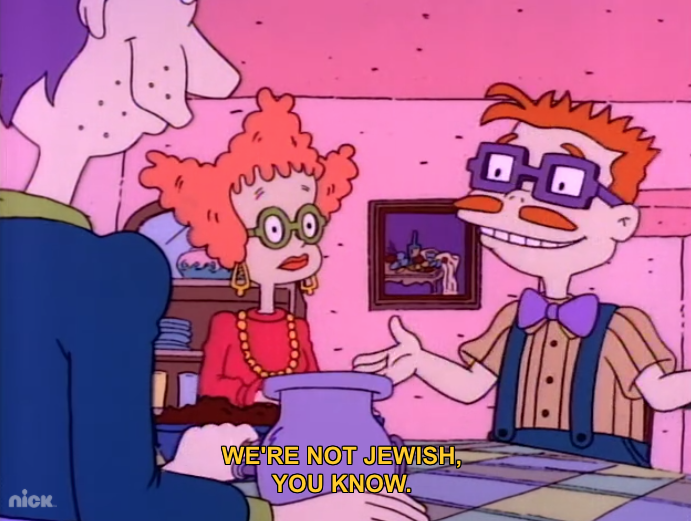
Fact check #6: including non-Jews at Passover.
Verdict: Accurate. Some Haggadahs include the line, “Anyone who is famished should come and eat, anyone who is in need should come and partake of the Pesach sacrifice.” Many Jewish families take this to mean including as many as possible in the seder.
Back to the plot… Chuckie is disappointed by the lack of toys in Tommy’s grandparents’ house. Tommy explains, “They got better toys, Chuckie, only they’re all the way upstairs in the attic.” They try to “bust out” of their playpen — except Tommy left his screwdriver in his other diaper! Gasp! Angelica lets them out of the playpen, because, “Passover’s all about freedom.”
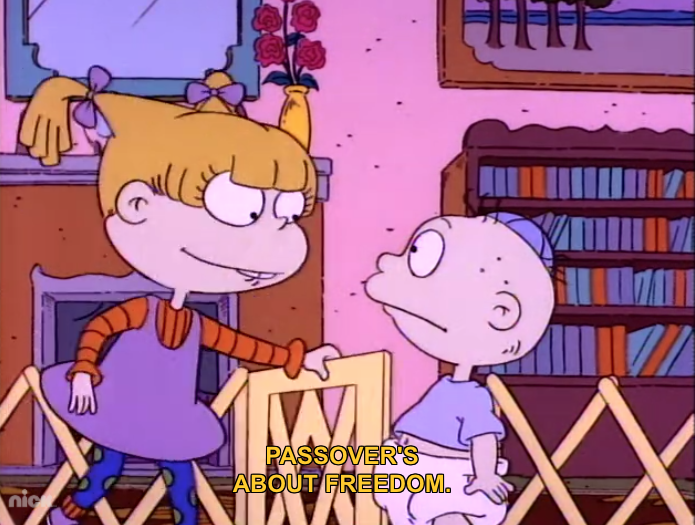
The three of them set off to the attic, while the adults sit down to the seder table.
Stu has to lead the seder because Boris is still MIA. The seder table seems to have all the key things: a seder plate, a glass for Elijah, matzah, and Haggadahs.
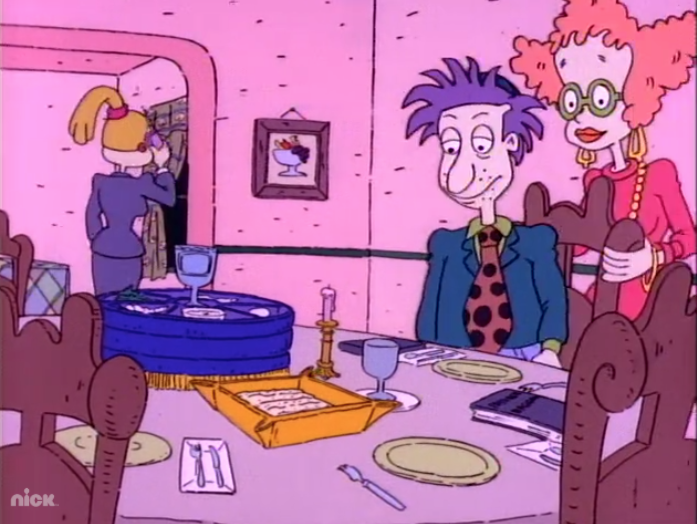
Fact check #7: what’s on the seder table.
Verdict: Accurate. It really seems like Rugrats has all its bases covered here. As My Jewish Learning writes, “The seder plate (k’arah), which serves as the centerpiece of the seder table. The seder plate traditionally holds five or six items.” There’s also three pieces of matzah.
Meanwhile… Tommy, Chuckie, and Angelica venture to the attic, where they find Tommy’s grandpa Boris!
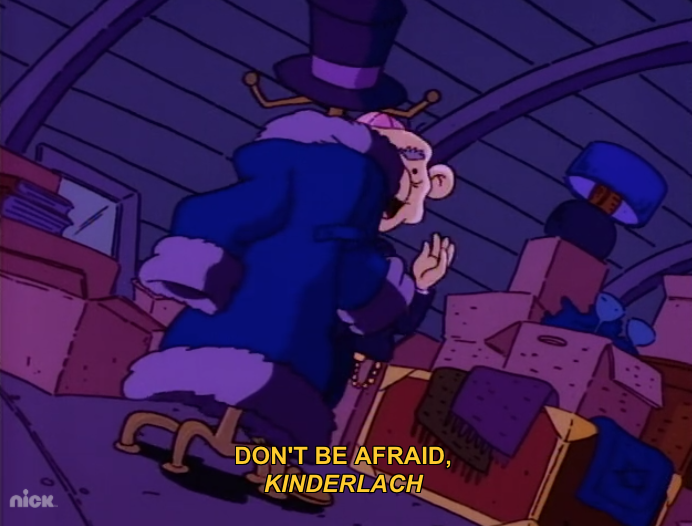

Fact check #8: the word kinderlach.
Verdict: Accurate. It’s a Yiddish word that means children.
They all get stuck in the attic because the door doesn’t open from the inside. Angelica reassures Grandpa Boris that he’s not missing anything ’cause it’s a dumb holiday, but Grandpa Boris, indignant, tells her it’s the best holiday.
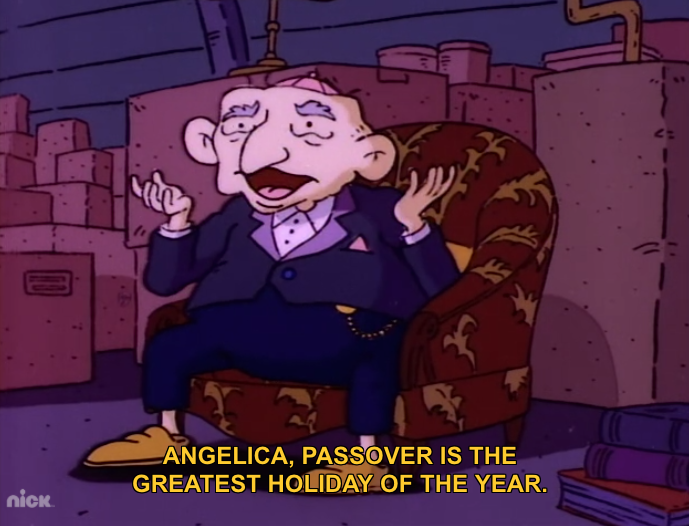
Fact check #9: Passover is the greatest.
Verdict: Unclear. This is a very subjective statement, after all.
We go back down to the adults’ seder, where Didi reprimands Stu for not using enough emotion while reading the Haggadah. Chuckie’s dad goes to check on the kids and discovers them missing.
But back to Boris and the kids, more important. Boris begins the story of Passover…
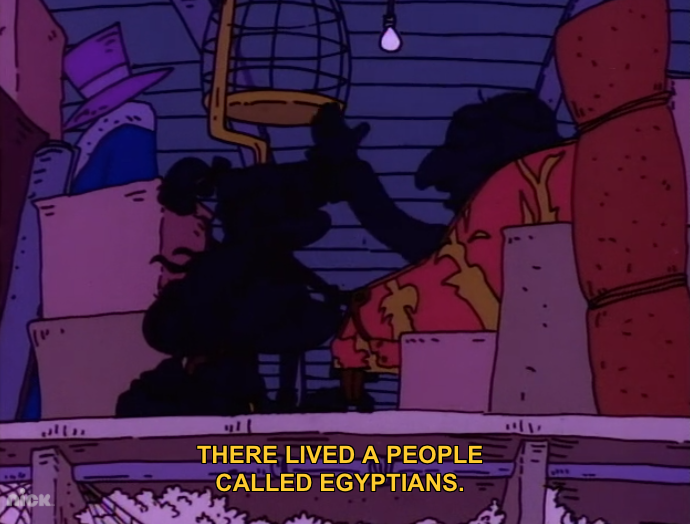
Boris tells the kids, “Many thousands of years ago, there a lived a people called the Egyptians. They were very powerful and built all kinds of beautiful cities and buildings. But there also lived in Egypt the Jewish people, the Hebrews. At first, they all lived happily together, side by side… Now, the Egyptian Pharaoh… the Pharaoh, he was kinda of like a king. And this Pharaoh person decided all the Hebrews had to be slaves of the Egyptians. He made them pull heavy stones, and work in the hot sun, and do whatever else he wanted.”
Fact check #10: The Egyptians and Hebrews used to live in peace.
Verdict: Accurate. Remember Joseph (And the Amazing Technicolor Dreamcoat)? The Hebrews ended up in Egypt after a long chain of events, where they lived side by side with the Egyptians.
Fact check #11: Pharaoh decides to enslave the Hebrews.
Verdict: Accurate. Exodus 1:8 – 13 says, “A new king arose over Egypt who did not know Joseph. And he said to his people, ‘Look, the Israelite people are much too numerous for us…..’ So they set taskmasters over them to oppress them with forced labor; and they built garrison cities for Pharaoh: Pithom and Raamses.”
Fact check #12: heavy stones and hot sun.
Verdict: Accurate. Exodus 1:13 – 14 says, “The Egyptians ruthlessly imposed upon the Israelites the various labors that they made them perform. Ruthlessly they made life bitter for them with harsh labor at mortar and bricks and with all sorts of tasks in the field.” Boris 👏 knows 👏 his 👏 Exodus👏 story👏.
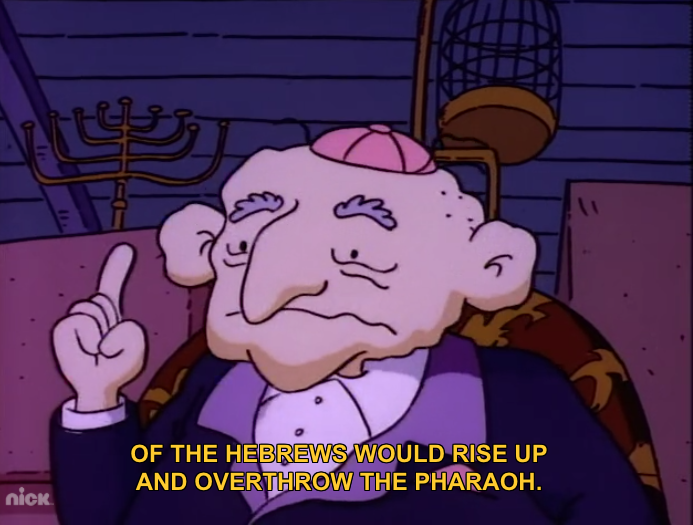
Boris continues the story, “One day, it was foretold that a leader of the Hebrew people would rise up and overthrow the Pharaoh. The Pharaoh was very worried, so he told the Hebrews to throw all their boy babies in the Nile river.”
Fact check #13: prophecy about a Hebrew leader overthrowing the Pharaoh.
Verdict: False. This isn’t really the order of events. Pharaoh is frustrated by how much the Israelites kept growing through reproduction, not worried about a future leader.
Fact check #14: telling Hebrews to throw their boys thrown in the Nile.
Verdict: Accurate-ish. At first, Pharaoh doesn’t tell the Hebrews as a whole, he tells two Hebrew midwives (who are badass), Shiphrah and Puah, to kill Hebrew baby boys. They don’t listen to Pharaoh because they feared God. After the midwives don’t work, Pharaoh, according to Exodus 1:22, “charged all his people, saying, ‘Every boy that is born you shall throw into the Nile, but let every girl live.'”
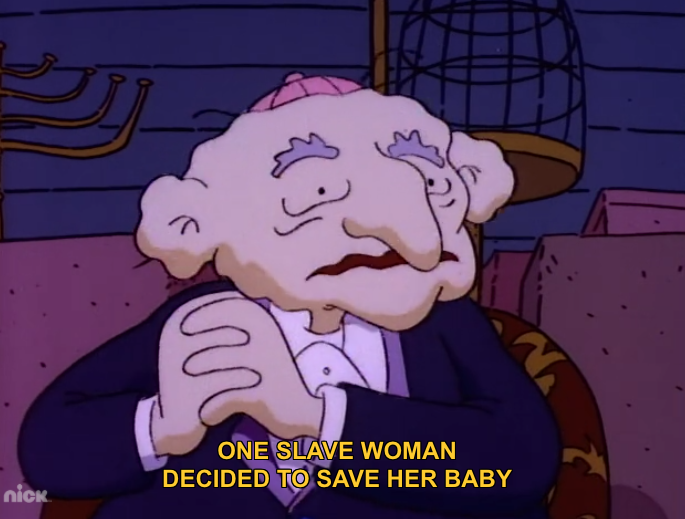
The story continues: “One of the slave women decided to save her baby by putting him in a basket and sending him down the river.”
Fact check #15: Hebrew woman sends her baby in a basket down the Nile.
Verdict: Accurate. This is Moses’ mom, Yocheved, who defied the Egyptians and sent her baby down the river. (Are you singing Ofra Haza’s “River Lullaby” from The Prince of Egypt in your head right now? Cause same.)
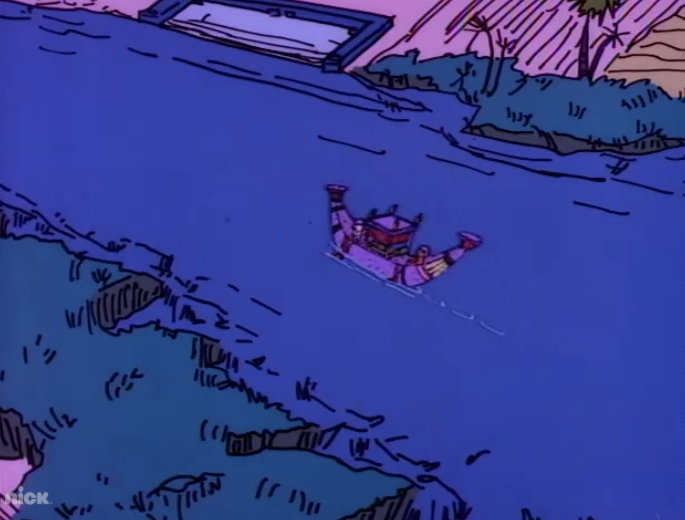
After Moses gets sent down the Nile, Boris says, “The Pharaoh was floating by on the royal barge” and discovers the baby in the bushes and took him to the royal palace.
Fact check #16: Pharaoh discovers the baby.
Verdict: False. Pharaoh’s daughter actually discovers the baby. As Rishe Groner explains in “The Badass Biblical Women of Passover,” “Batya was a fearless priestess princess who didn’t care what people said: She was adopting this baby, and Moses would be her son, no matter what the Egyptian priests, astrologers, and her dad the king said.”
At this point in “A Rugrats Passover” (you still with us?), Tommy, Chuckie, and Angelica are reenacting the story, so it gets a little wonky. Pharaoh (Angelica) asks Moses (Tommy) to help run Egypt. Boris explains, “Pharaoh didn’t know Moses was a Hebrew.”
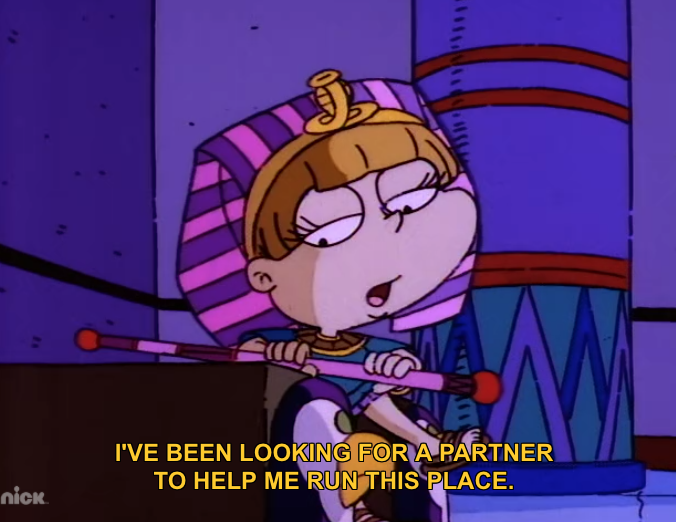
Fact check #17: Pharaoh asks Moses to help run Egypt.
Verdict: Accurate-ish. Moses is raised as part of the royal family, so it’s assumed that Pharaoh trusted Moses with the affairs of the country. (At least, The Prince of Egypt thinks so.)
Fact check #18: Pharaoh didn’t know Moses was a Hebrew.
Verdict: Unsure. We don’t really know what Pharaoh knew about Moses, but Exodus 2:6 says Pharaoh’s daughter knew the baby was a Hebrew child.
At this point in the story, Chuckie’s dad finds them in the attic and gets stuck with them. Boris continues the story. “Pharaoh made Moses his helper. Then one day, Moses was watching the Hebrews as they built a new city for Pharaoh.”
And we flash back to the baby version of Egypt — where Tommy/Moses sees the babies pushing blocks around. He’s confused, asking them why they’re not allowed to have fun because he’s a baby and Pharaoh lets him have fun.
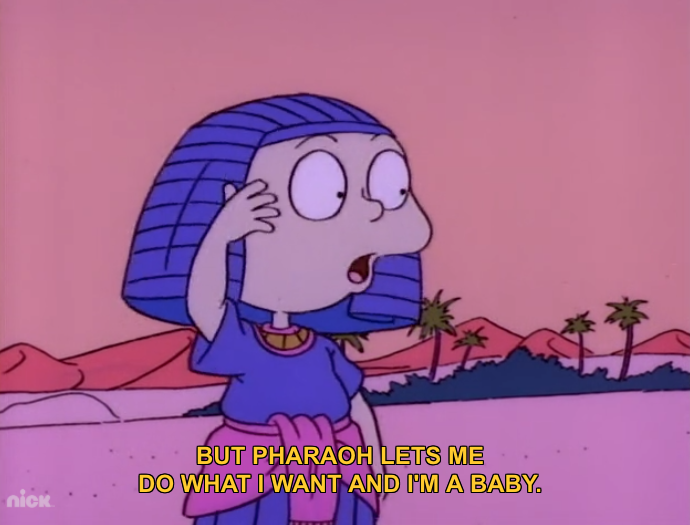
Okay, keeping with the internal logic that babies = Hebrews…
Fact check #19: Moses knew he was a Hebrew, and was confused why Hebrews were enslaved.
Verdict: We don’t know. It’s not explicit in the text whether or not Moses knew he was a Hebrew, but he lived happily as an Egyptian.
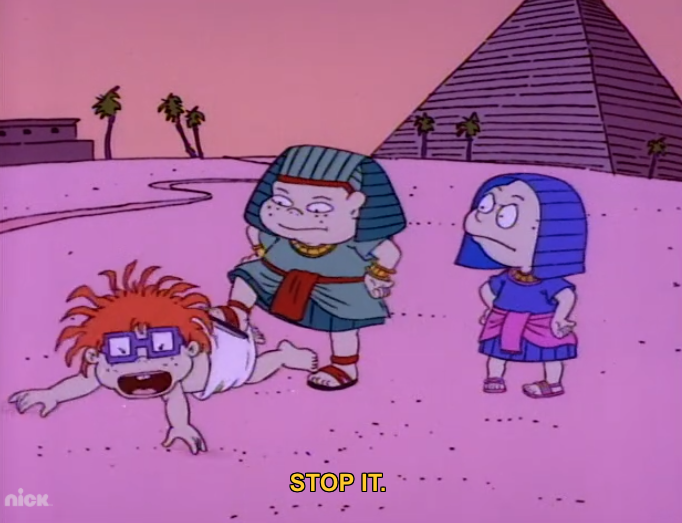
An Egyptian overseer pushes Chuckie (a baby) and Moses/Tommy gets mad, telling him, “You can’t treat babies like that,” and pushes the Egyptian. The babies warn Moses/Tommy he’s going to get in trouble once Pharaoh finds out he’s a baby. Chuckie tells Moses/Tommy, “Moses, I think you better get out of here.”
Fact check #20: Moses confronts an Egyptian he sees beating a Hebrew.
Verdict: Accurate. According to Exodus 2:11-12, “When Moses had grown up… He saw an Egyptian beating a Hebrew, one of his kinsmen. He turned this way and that and, seeing no one about, he struck down the Egyptian and hid him in the sand.”
Fact check #21: Moses flees.
Verdict: Accurate. After killing an Egyptian, Moses flees to Midian, aka the desert.
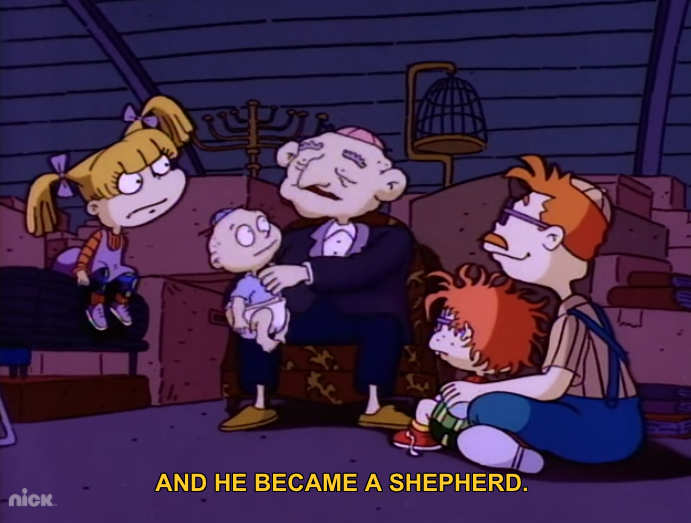
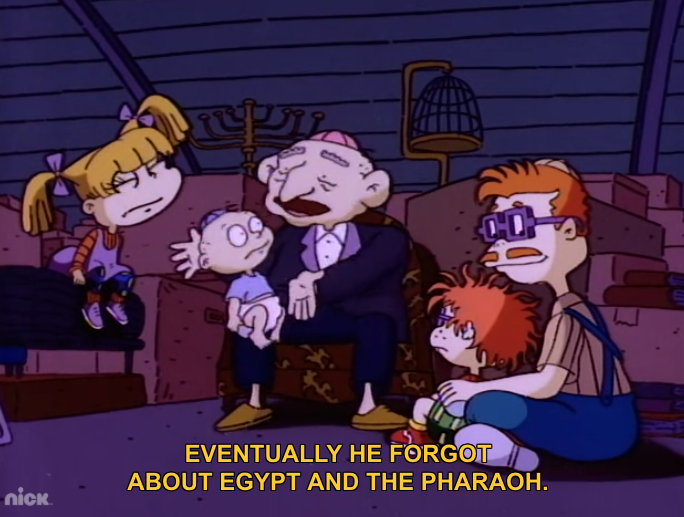
Fact check #22: Moses becomes a shepherd, and forgets all about Egypt.
Verdict: Accurate-ish. He becomes a shepherd, marries Tzipporah, but Exodus never really says anything about him forgetting Egypt.

Boris continues the story: Moses was out one day and saw a burning bush. The bush spoke to him and told Moses he must return to Egypt and “demand that Pharaoh stop making his people slaves.”
Fact check #23: God comes to Moses in a burning bush and tells him to return to Egypt to lead the Hebrews out of slavery.
Verdict: Accurate. God tells Moses in Exodus 3:10, “I will send you to Pharaoh, and you shall free My people, the Israelites, from Egypt.”
Then in the baby-version of the Exodus story, we see delegations from Ethiopia, China, and Persia bringing Pharaoh gifts. Then Moses/Tommy appears, telling Pharaoh, “Let my babies go!” Pharaoh remains unconvinced, so Moses/Tommy warns Pharaoh that “scary things will happen,” and his rod turns into a snake. Pharaoh is unconvinced, saying it’s just a magic trick and that they can do magic too (cue up “Playing with the Big Boys” from Prince of Egypt).
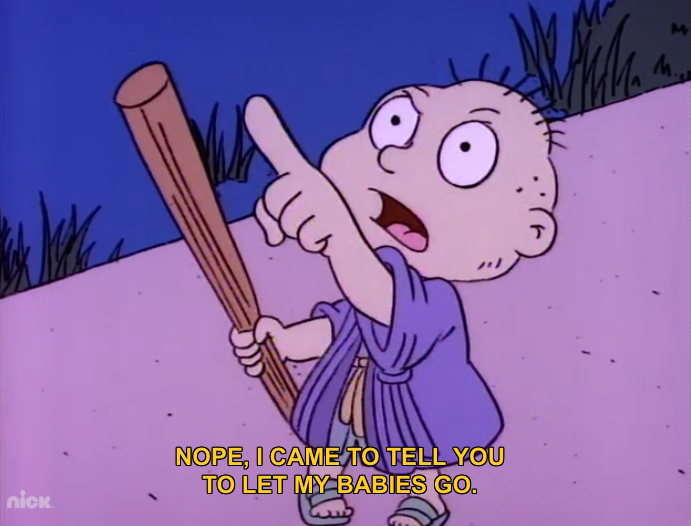
Fact check #24: Moses returns to Pharaoh and tells him, “Let my people go!”
Verdict: Accurate. DAYENU!
Fact check #25: Pharaoh is unconvinced.
Verdict: Yep.
Fact check #26: To prove himself, Moses’ rod turns into a serpent.
Verdict: Kinda accurate. It’s not Moses’ rod, but Aaron’s. Exodus 7:10 says, “So Moses and Aaron came before Pharaoh and did just as the LORD had commanded: Aaron cast down his rod in the presence of Pharaoh and his courtiers, and it turned into a serpent.”
Fact check #27: Pharaoh says Egyptians can do magic, too.
Verdict: Accurate. After Aaron’s rod turns into a serpent, Pharaoh summons Egyptian magicians and they turn their rods into serpents. Then Aaron’s rod-serpent swallows their rod-serpents.
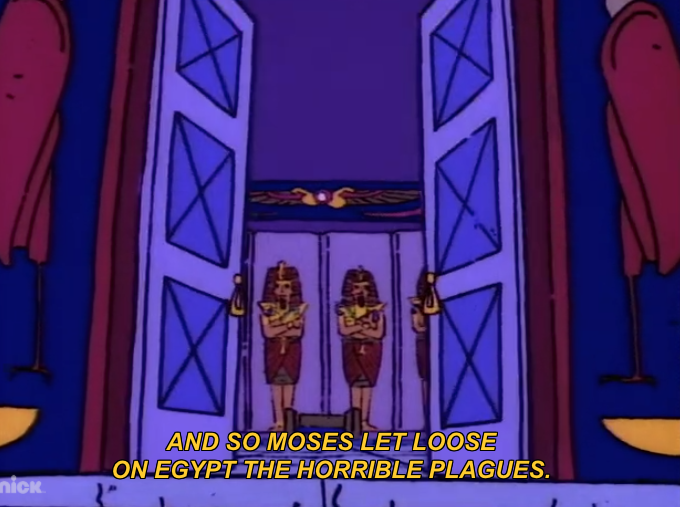
Back to Boris’ narration, where he says the plagues are: frogs, lice, darkness, wild beasts, locusts. And after that, Boris explains, Pharaoh says the Hebrews could go.
Fact check #28: Moses unleashes five plagues, and the Hebrews prepare to leave.
Verdict: False. There were 10 plagues: Blood, Frogs, Lice, Flies, Pestilence, Boils, Hail, Locusts, Darkness, and Killing of the firstborn.
As Wikipedia points out, “The writers were forced to audit many elements of the portrayal of the Ten Plagues, particularly the last one, so that the episode would remain accessible to children and not too frightening.”
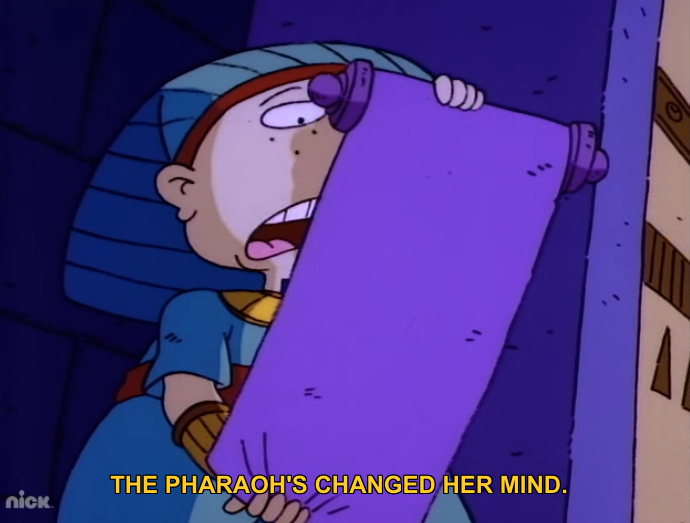
So, Boris explains, the Hebrews prepare to leave Egypt, when the Pharaoh changes his mind.
Fact check #29: Pharaoh decides the Hebrews aren’t allowed to leave.
Verdict: Not quite. In Exodus, they do leave before Pharaoh changes his mind.
But… maybe that’s Pharaoh rejecting Moses’s plea after the initial plagues. Because, Boris now explains, there’s “one final plague, more terrible than all the others. He announced that the firstborn of every Egyptian household would be taken away.”
Fact check #30: The final plague was the killing of the firstborn.
Verdict: Accurate.
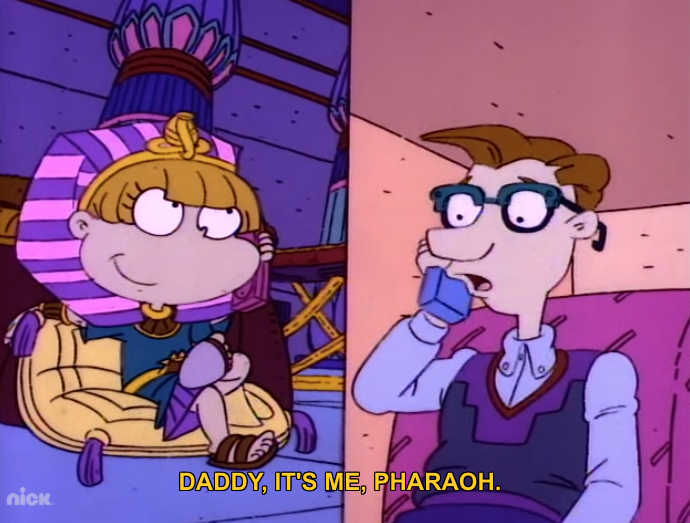
Pharaoh/Angelica, after hearing Moses’ threat, calls her dad and asks if she’s the firstborn. After learning she is, she realizes she’s in trouble.
Fact check #31: Pharaoh worries he’s going to die from the 10th plague.
Verdict: False. Pharaoh is spared, but his first-born is killed.
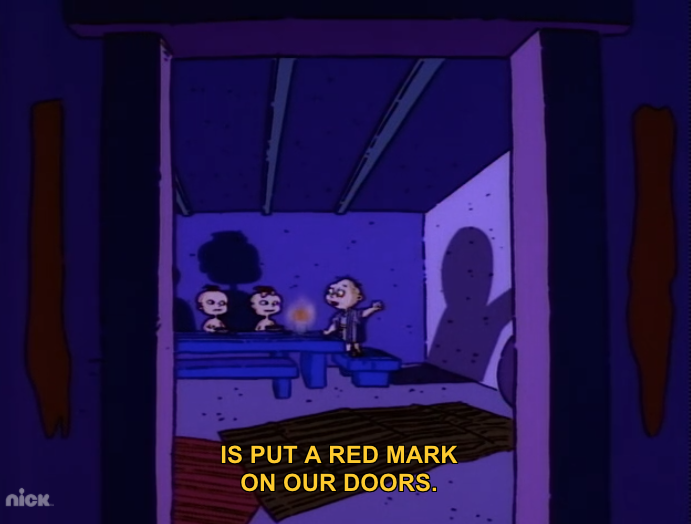
Fact check #32: Hebrews are protected from the plague by a red mark.
Verdict: Accurate. While not explicit, this represents the Hebrews painting their doorposts with lamb’s blood so their firstborn are not killed.
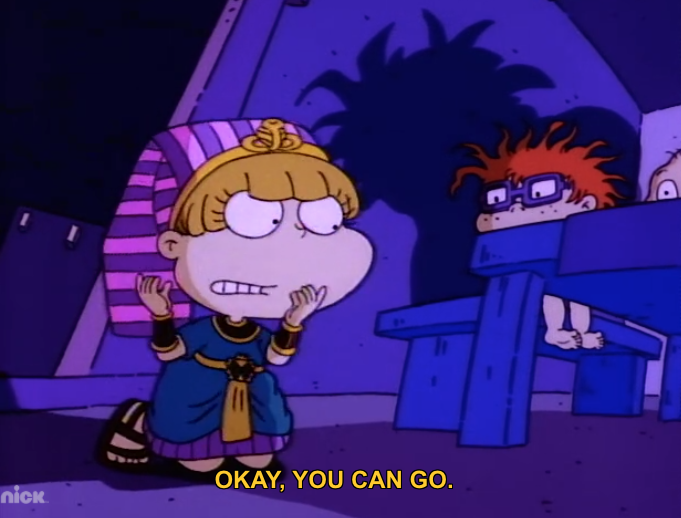
Pharaoh goes to Moses/Tommy and tells him they can go if they “call off this firstborn thing.”
Fact check #33: The Hebrews leave cause they call off the 10th plague.
Verdict: False. They leave after Pharaoh and all of Egypt is hurt by the 10th plague.
And so: The babies leave Egypt! With flat bread, because Chuckie forgot to put yeast in the bread. But hey, Chuckie invented matzah!
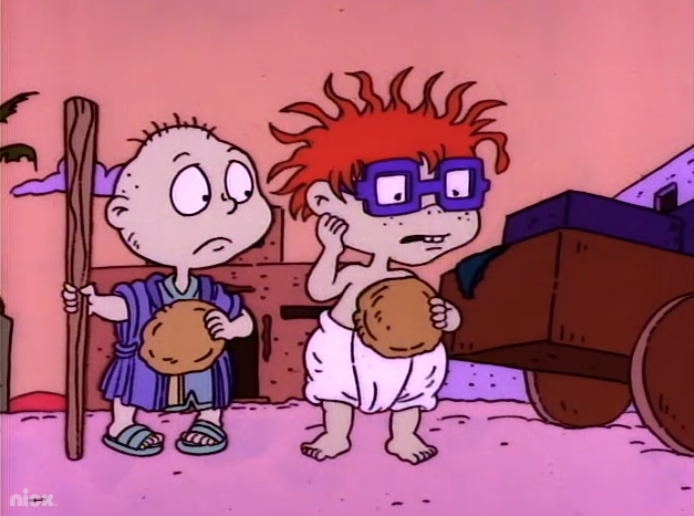
Fact check #34: Matzah was invented because they forgot yeast.
Verdict: False. Matzah/unleavened bread was because the Hebrews rushed out of Egypt and didn’t have time for their bread to rise.
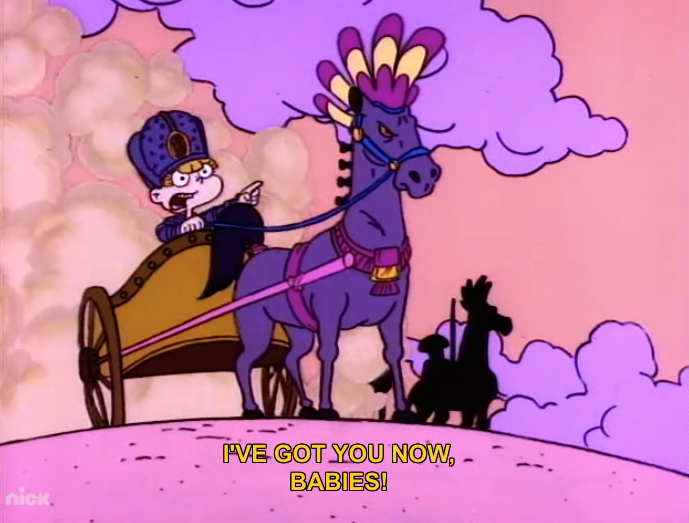
Pharaoh has second thoughts about letting the Hebrews go, so he pursues them in a chariot with the rest of the Egyptians.
Fact check #35: Pharaoh and the Egyptians pursue the Hebrews.
Verdict: Accurate. Exodus 14:5 says, “When the king of Egypt was told that the people had fled, Pharaoh and his courtiers had a change of heart about the people and said, ‘What is this we have done, releasing Israel from our service?'”
Boris wraps up the story: “Now, the Hebrews were at the edge of the Red Sea with the ocean in front of them and Pharaoh’s army behind…” And so Moses parts the Red Sea, and they make it to the other side, and the water closes in on the pursuing Egyptian army.
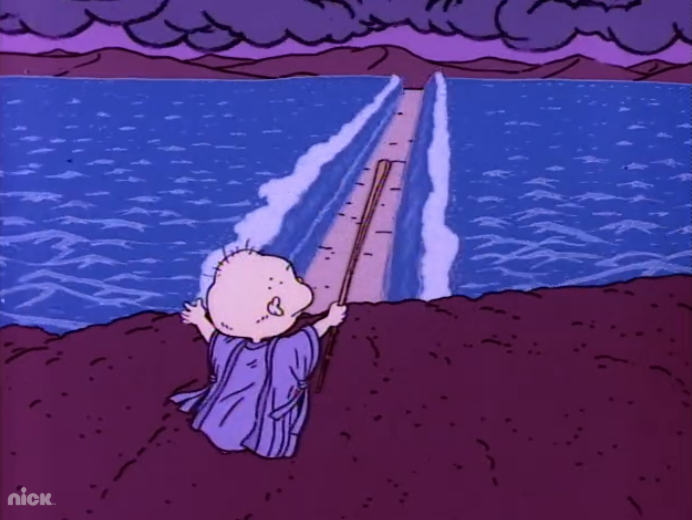
Fact check #36: Moses parts the Red Sea so the Hebrews can escape the Egyptian army and Pharaoh.
Verdict: Accurate. Iconic.
And the Hebrews make it to freedom.
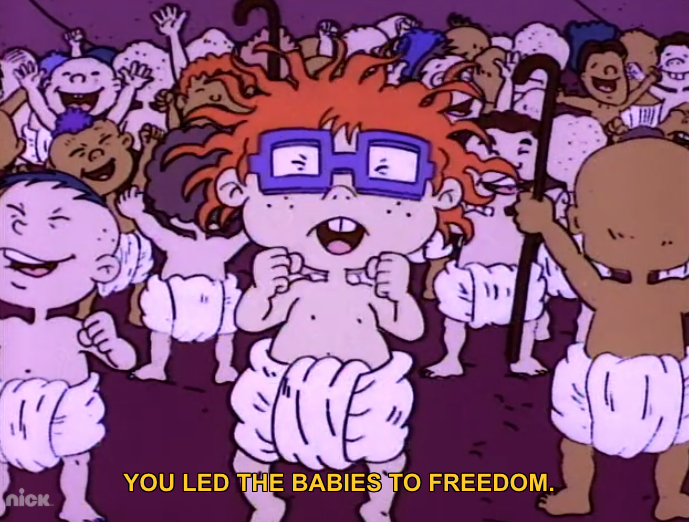
Fact check #37: Moses leads the Hebrews to freedom.
Verdict: Accurate.
We gotta give it to you, Rugrats: You did good.
Happy Passover!
